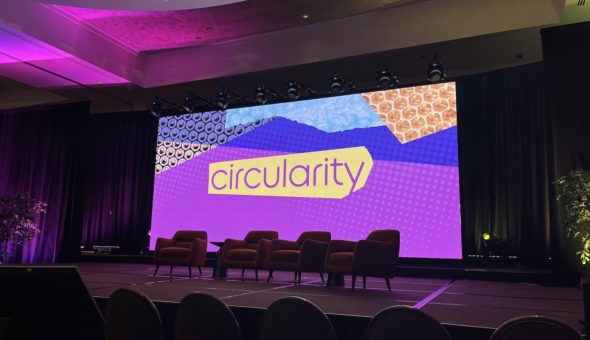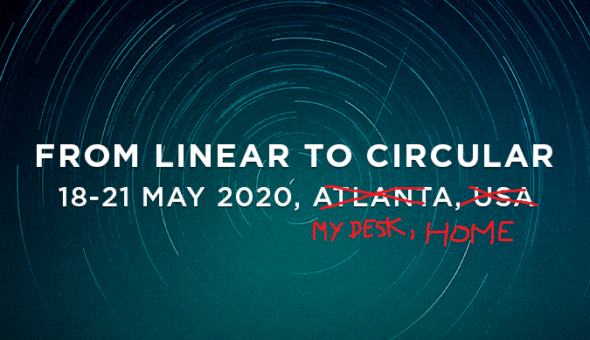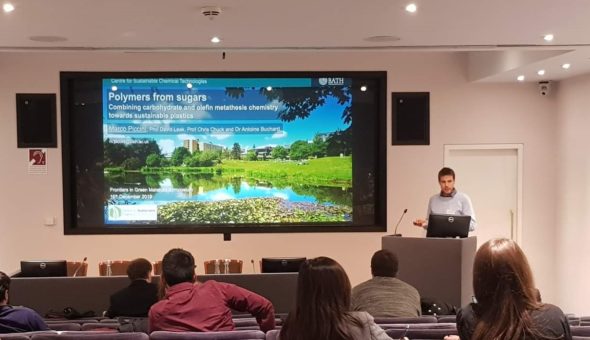Laura English is a final-year PhD student working on designing and using phosphorus oxides to make specialised phosphorus-based molecules that can be used in chemical transformations, such as the selective breakdown of waste polymers to produce commodity chemicals. After attending a number of online conferences in 2021, Laura reflects on the different approaches taken in the organisation and delivery of these events.
Over the summer of 2021, I had the opportunity to attend three exciting conferences – a Royal Society of Chemistry conference, Dalton 2021; the CSCT Summer showcase; and the Bolland Symposium (the University of Bath Chemistry Department’s annual student showcase), which I also helped to organise. As with most events post-Covid, they all had some virtual aspects – whether they were entirely virtual, like Dalton 2021 and the Summer Showcase, or hybrid events, like the Bolland Symposium.
There are many benefits to the emergence of online attendance to conferences that has become part of the post-pandemic culture. Delegates without access to travel money can still attend these events, and they open up a greater avenue to speakers that may otherwise turn down invitations due to other commitments.
The three conferences that I attended used different approaches to their online attending styles and used multiple platforms, providing a good way to compare them.
- Dalton 2021, 29/06-01/07, Platform: InEvent
The Dalton Joint Interest Group Conference is a biennial conference organised by members of the RSC with an inorganic chemistry focus. It’s divided into four themes, each with their own session running in parallel with the others across the three days - Coordination and Organometallic Chemistry, Inorganic Biochemistry, Inorganic Reaction Mechanisms, and Main Group Chemistry.
The whole conference was hosted on InEvent and secure links were sent out each day to the attendees to access the event. The platform had clear signposting for each of the parallel sessions running throughout the day and a separate tab for poster presentations, schedule, and the abstract booklet - you had everything you needed at your fingertips! Since my research is on Main Group Chemistry, this was my main focus throughout the conference, but I also learned a lot about different reaction pathways by watching some of the recordings after the session from the Inorganic Reaction Mechanisms session.
- My favourite aspect of the online feature: The InEvent link is still active, and the recordings of the presentations are still accessible months later.
- Tips I have picked up for future online conferences: Make the most of the recordings, especially if there are parallel sessions running – this way you don’t have to choose between two talks that look interesting but start at the same time.
- Conference Highlight: The first talk of the first day was by my favourite. A student named Stephanie Urwin from the University of Oxford gave a very engaging talk on cyaphide (the phosphorus analogue of cyanide) chemistry that appealed to me due to my own interest in phosphorus chemistry.
- CSCT Summer Showcase 2021, 07/07-09/07, Platforms: Zoom and Gather.town
The CSCT Summer Showcase is an annual conference that allows the students and partners of the CSCT to showcase their work. The research highlighted spans multiple disciplines – from engineering to biology and everything between, and from work based in research labs at the University to that on placements such as those in industry. I have attended four of these events, two in person and two online – this one being my second online.
Zoom allowed a smooth transition to the online format, as most of the attendees were more than used to the platform by then. In 2021, the theme of the summer showcase was “Race to Zero” with a focus on climate change policy with interesting world-wide perspectives from the speakers.
Alongside this, students were also given the opportunity to present their work in various formats, from 1-minute flash presentations to 3-Minute-Thesis style talks and longer in-depth presentations. Not only does this provide a glimpse of the wide range of research being conducted by the students at the CSCT, but the students presenting get the opportunity to gain skills presenting in different styles, something that is well sought-after in future careers. The use of Gather.town for poster sessions was also a fun addition as it allowed the attendees to walk around a poster room and give a more in-person feel to an online conference.
- My favourite aspect of the online feature: Zoom is compatible with a range of devices, and I could move around while still enjoying the conference talks rather than being glued to a computer.
- Tips I have picked up for future online conferences: If you get the chance to have a taster of a platform that you haven’t used before, take it. Gather town was new to me and I appreciated that the CSCT offered a trial for the attendees before the conference to work out the kinks before the poster sessions.
- Conference Highlight: The Summer Showcase always gives a wonderfully different spin to conferences, highlighting the collaborations between the centre and their partners. I really enjoy hearing about how the research happening at the centre fits in to the wider world.
- University of Bath Chemistry Department Bolland Symposium 2021, 09/09, Platform: In-person/zoom
The Bolland Symposium is an annual conference organised by the Department of Chemistry’s Post-graduate Executive committee which gives students an opportunity to showcase their work. The format is usually in person, with final year PhD students giving 20-minute talks about their research and all other students are asked to present posters. This year, due to the pandemic, the event was organised in a hybrid in-person/online fashion. Those that wanted to attend in person could do so and those that didn’t could access the conference via a live Zoom meeting streamed from the conference venue. I had the pleasure of being part of the organising committee for this event, and while it was stressful at the time, I fondly look back on it as an experience during which I gained useful skills. The conference was split into two parallel sessions and the presentations in these sessions split into the four different sections of the department: Organic, Inorganic, Physical and Computational. As an inorganic chemist myself I particularly enjoyed watching the presentations by the students who do research in the same section that I do, but it was also really interesting to see the other exciting research that is being conducted in the other sections of my department that I do not hear about every day. The poster session for this conference was in-person which was nice to attend but the only drawback was that online attendees couldn’t view the posters as with the other two conferences that I attended.
- My favourite aspect of the online feature: While the conference was primarily in person, having the online feature allowed students that would not have otherwise been able present or attend the opportunity to do so, and it allowed us to host an amazing plenary speaker from the USA without being limited by budget constraints.
- Tips I have picked up for future online conferences: Get involved in the organisation if you can, it is a useful experience that gives you a greater understanding for how much work goes in to organising events like these and gives the opportunity to gain new skills while doing so.
- Conference Highlight: The plenary speaker at the Bolland Symposium was Dr Donna Nelson, who was once the science advisor for the TV show Breaking Bad and is also an advocate for equality and diversity in science. She gave two talks, and the one on her wok in TV inspired me that we scientists can make a difference to the world with more than just our research.
Overall, I thoroughly enjoyed my foray into online conferences and look forward to a future where this might become the norm. Easier access to research from a wider range of locations and to a wider range of presenters can only be a good thing for the future. Although I would like to see the return of wine receptions…
Respond



